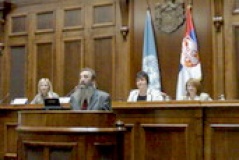National Assembly of the Republic of Serbia / Activities / Activity details

Tuesday, 17 October 2006
World Poverty Day – roundtable held at Assembly House
To mark World Poverty Day, the National Assembly’s Poverty Reduction Committee organised a roundtable devoted to ‘Fighting poverty – a step towards prosperity’ at Assembly House on 17 October 2006.On behalf of the organisers, the attendees were welcomed by the chairperson of the Poverty Reduction Committee, Snezana Stojanovic-Plavsic, who underlined that another four Assembly committees were involved in the roundtable – the Committee on Labour, Ex-Servicemen’s and Social Issues, the Education Committee, the Agriculture Committee, and the Local Self-Government Committee – and that the United Nations Development Programme (UNDP) Serbia Office was supporting the event.
To mark World Poverty Day, the National Assembly’s Poverty Reduction Committee organised a roundtable devoted to ‘Fighting poverty – a step towards prosperity’ at Assembly House on 17 October 2006.
On behalf of the organisers, the attendees were welcomed by the chairperson of the Poverty Reduction Committee, Snezana Stojanovic-Plavsic, who underlined that another four Assembly committees were involved in the roundtable – the Committee on Labour, Ex-Servicemen’s and Social Issues, the Education Committee, the Agriculture Committee, and the Local Self-Government Committee – and that the United Nations Development Programme (UNDP) Serbia Office was supporting the event.
In his welcoming address, the Chairman of the National Assembly of the Republic of Serbia, Predrag Markovic, emphasised that World Poverty Day was a global event, and that the issue of fighting poverty was not just one of money, but also one of action, which was, he said, why it was necessary for both government bodies and NGOs to join forces with trade unions, employers, and local authorities, as well as with donors such as the World Bank and UNDP.
‘Poverty is not just a problem for poor countries – it also affects rich nations. Poverty is a form of humiliation, as it blocks human existence and people’s ability to help themselves and others. It is also a challenge; the key weapon against it is solidarity’, Markovic said, adding that the first step in eliminating poverty would be to stop poor countries from getting any poorer.
Markovic reiterated that
The roundtable was also addressed by David Lance Clark, UNDP Representative to
Ana Draskovic addressed the roundtable on behalf of the World Bank’s Serbia Office. Ms Draskovic presented World Bank activities and projects, with a special emphasis on those involving poverty reduction in
State Secretary for Social Policy, Vesna Piperski-Tucakov, said that this year’s World Poverty Day was being marked under the slogan ‘From poverty to prosperity’, and underlined that disabled persons were not fully integrated into political and social life.
Gordana Rajkov, of the Centre for Independent Living Serbia, spoke of poverty-related problems faced by disabled persons; the roundtable was also addressed by Damjan Tatic, who presented the International Convention on the Rights of Persons with Disabilities.
Finally, the roundtable was addressed by the Committee’s chairperson, Snezana Stojanovic-Plavsic. Speaking of activities undertaken by the Committee and the National Assembly in this field so far, she specially underlined the fact that, out of a total of 108 adopted laws directly relating to poverty reduction, 63 had been foreseen by the Poverty Reduction Strategy.
According to Ms Stojanovic-Plavsic, the degree of poverty in
-
12.30 - the National Assembly Speaker meets with the ODIHR Director (National Assembly House, 13 Nikola Pasic Square)
-
13.00 - the Chairman of the Committee on Human and Minority Rights and Gender Equality meets with the delegation of the OSCE Mission in the Republic of Serbia (National Assembly House, 13 Nikola Pasic Square, hall 3)
-
13.30 - press conference of National Assembly Speaker Ana Brnabic (National Assembly House 13, Nikola Pasic Square, Central Hall)

